COP26: Analyzing EU's Carbon Neutrality by 2030 & Paris Agreement
VerifiedAdded on 2023/06/14
|7
|1391
|71
Report
AI Summary
This report critically analyzes the EU's ambitious goal of achieving carbon neutrality by 2030, examining its feasibility and alignment with the Paris Agreement. It evaluates the EU's climate target plan, stakeholder involvement, and the role of renewable energy in reaching this objective. The report also addresses concerns about carbon offsetting and the potential for organizations in the Western world to achieve zero emissions through technological advancements and increased removal of greenhouse gases. Ultimately, it concludes that achieving this target requires substantial investment, careful attention to social trade-offs, and the elimination of carbon legacy through high-quality carbon offsets. Desklib provides a platform for students to access this report and many other solved assignments to aid in their studies.
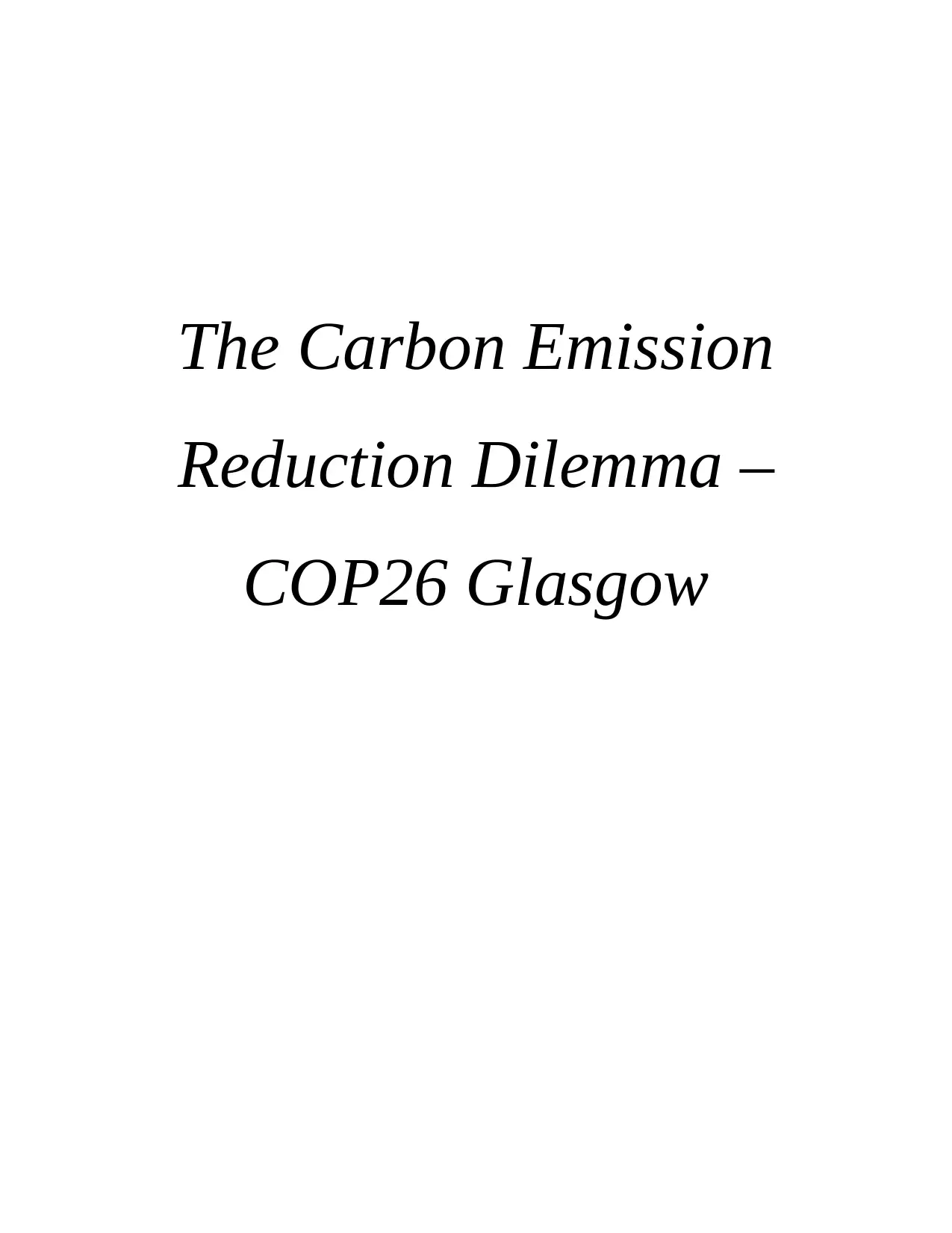
The Carbon Emission
Reduction Dilemma –
COP26 Glasgow
Reduction Dilemma –
COP26 Glasgow
Paraphrase This Document
Need a fresh take? Get an instant paraphrase of this document with our AI Paraphraser
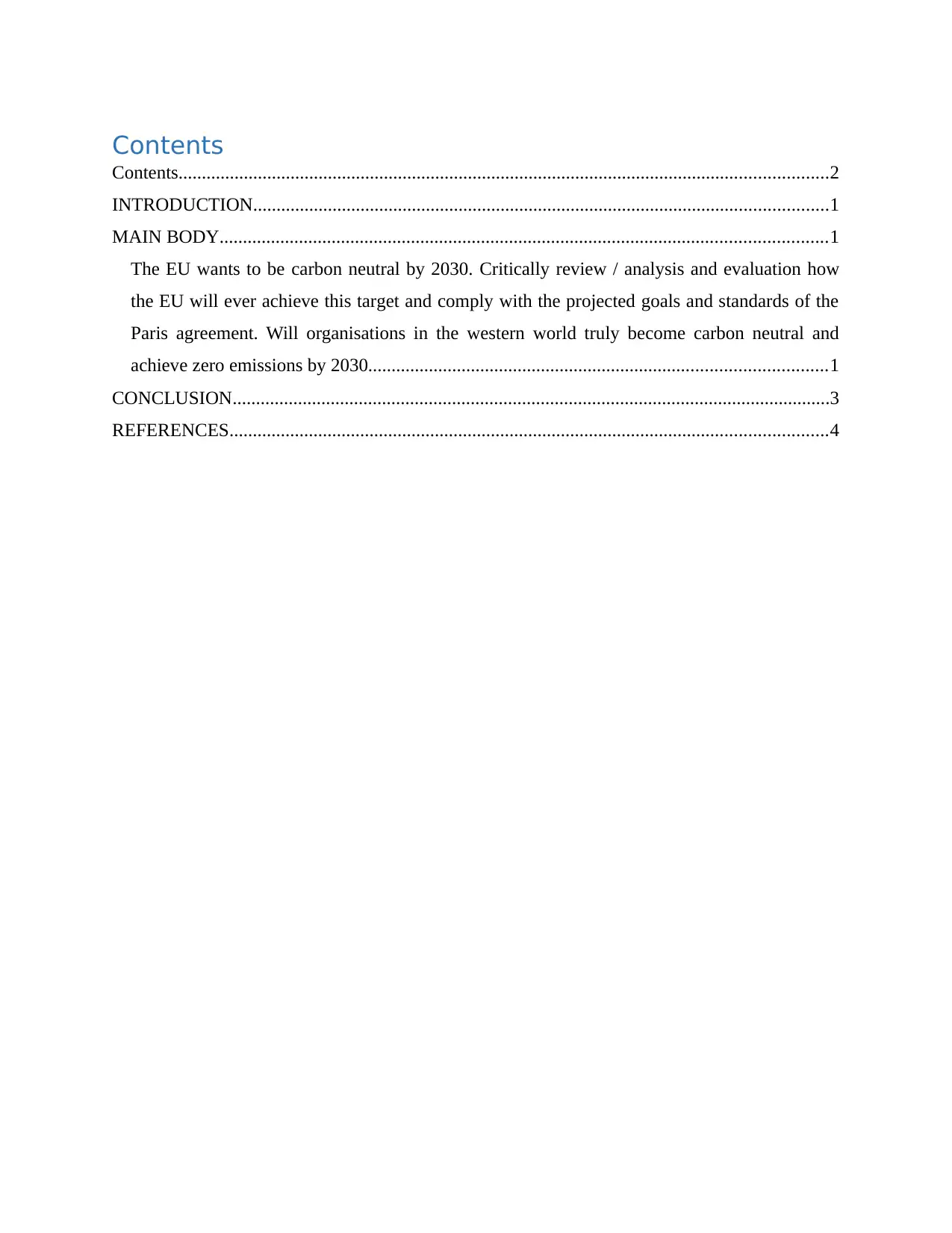
Contents
Contents...........................................................................................................................................2
INTRODUCTION...........................................................................................................................1
MAIN BODY..................................................................................................................................1
The EU wants to be carbon neutral by 2030. Critically review / analysis and evaluation how
the EU will ever achieve this target and comply with the projected goals and standards of the
Paris agreement. Will organisations in the western world truly become carbon neutral and
achieve zero emissions by 2030..................................................................................................1
CONCLUSION................................................................................................................................3
REFERENCES................................................................................................................................4
Contents...........................................................................................................................................2
INTRODUCTION...........................................................................................................................1
MAIN BODY..................................................................................................................................1
The EU wants to be carbon neutral by 2030. Critically review / analysis and evaluation how
the EU will ever achieve this target and comply with the projected goals and standards of the
Paris agreement. Will organisations in the western world truly become carbon neutral and
achieve zero emissions by 2030..................................................................................................1
CONCLUSION................................................................................................................................3
REFERENCES................................................................................................................................4

⊘ This is a preview!⊘
Do you want full access?
Subscribe today to unlock all pages.

Trusted by 1+ million students worldwide
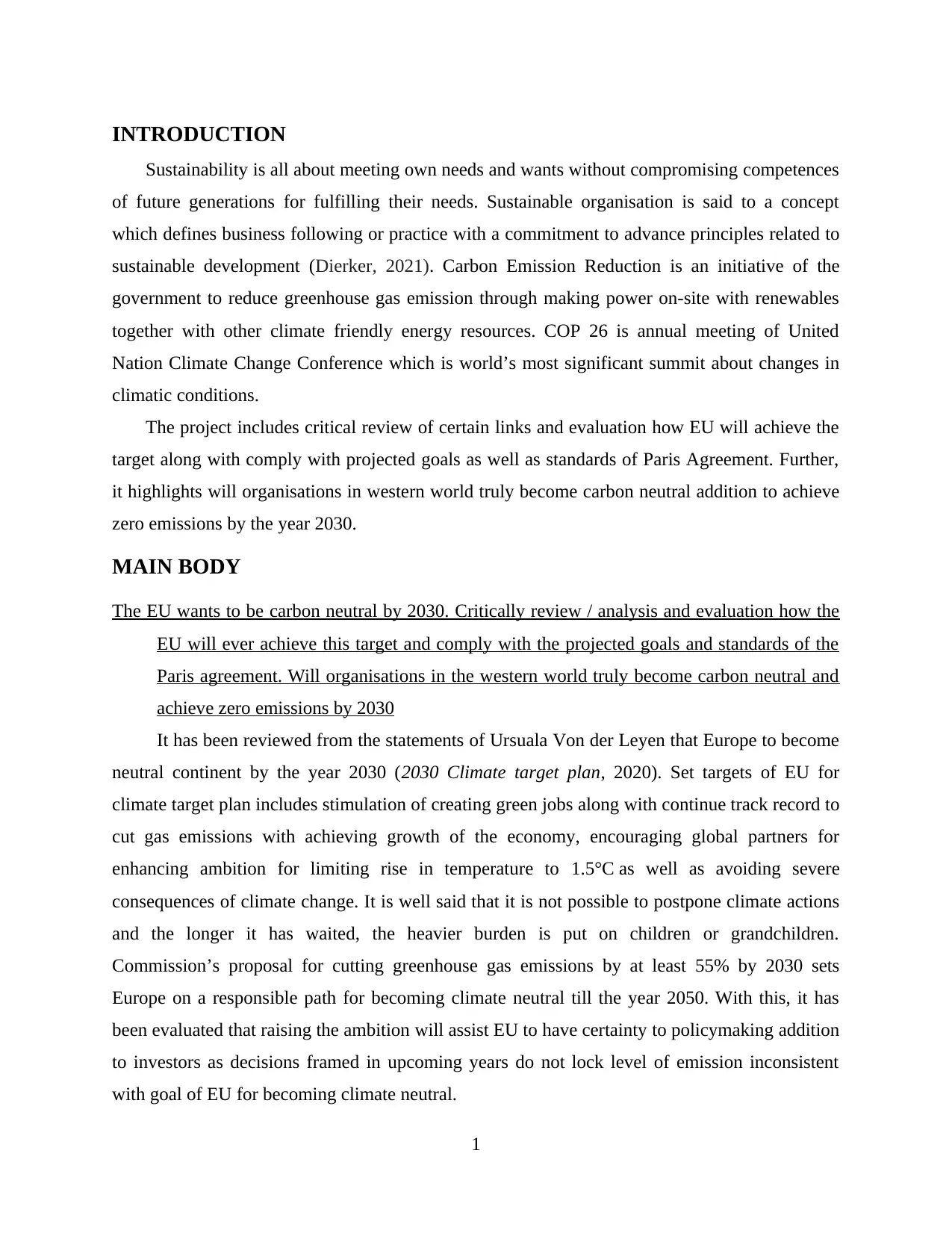
INTRODUCTION
Sustainability is all about meeting own needs and wants without compromising competences
of future generations for fulfilling their needs. Sustainable organisation is said to a concept
which defines business following or practice with a commitment to advance principles related to
sustainable development (Dierker, 2021). Carbon Emission Reduction is an initiative of the
government to reduce greenhouse gas emission through making power on-site with renewables
together with other climate friendly energy resources. COP 26 is annual meeting of United
Nation Climate Change Conference which is world’s most significant summit about changes in
climatic conditions.
The project includes critical review of certain links and evaluation how EU will achieve the
target along with comply with projected goals as well as standards of Paris Agreement. Further,
it highlights will organisations in western world truly become carbon neutral addition to achieve
zero emissions by the year 2030.
MAIN BODY
The EU wants to be carbon neutral by 2030. Critically review / analysis and evaluation how the
EU will ever achieve this target and comply with the projected goals and standards of the
Paris agreement. Will organisations in the western world truly become carbon neutral and
achieve zero emissions by 2030
It has been reviewed from the statements of Ursuala Von der Leyen that Europe to become
neutral continent by the year 2030 (2030 Climate target plan, 2020). Set targets of EU for
climate target plan includes stimulation of creating green jobs along with continue track record to
cut gas emissions with achieving growth of the economy, encouraging global partners for
enhancing ambition for limiting rise in temperature to 1.5°C as well as avoiding severe
consequences of climate change. It is well said that it is not possible to postpone climate actions
and the longer it has waited, the heavier burden is put on children or grandchildren.
Commission’s proposal for cutting greenhouse gas emissions by at least 55% by 2030 sets
Europe on a responsible path for becoming climate neutral till the year 2050. With this, it has
been evaluated that raising the ambition will assist EU to have certainty to policymaking addition
to investors as decisions framed in upcoming years do not lock level of emission inconsistent
with goal of EU for becoming climate neutral.
1
Sustainability is all about meeting own needs and wants without compromising competences
of future generations for fulfilling their needs. Sustainable organisation is said to a concept
which defines business following or practice with a commitment to advance principles related to
sustainable development (Dierker, 2021). Carbon Emission Reduction is an initiative of the
government to reduce greenhouse gas emission through making power on-site with renewables
together with other climate friendly energy resources. COP 26 is annual meeting of United
Nation Climate Change Conference which is world’s most significant summit about changes in
climatic conditions.
The project includes critical review of certain links and evaluation how EU will achieve the
target along with comply with projected goals as well as standards of Paris Agreement. Further,
it highlights will organisations in western world truly become carbon neutral addition to achieve
zero emissions by the year 2030.
MAIN BODY
The EU wants to be carbon neutral by 2030. Critically review / analysis and evaluation how the
EU will ever achieve this target and comply with the projected goals and standards of the
Paris agreement. Will organisations in the western world truly become carbon neutral and
achieve zero emissions by 2030
It has been reviewed from the statements of Ursuala Von der Leyen that Europe to become
neutral continent by the year 2030 (2030 Climate target plan, 2020). Set targets of EU for
climate target plan includes stimulation of creating green jobs along with continue track record to
cut gas emissions with achieving growth of the economy, encouraging global partners for
enhancing ambition for limiting rise in temperature to 1.5°C as well as avoiding severe
consequences of climate change. It is well said that it is not possible to postpone climate actions
and the longer it has waited, the heavier burden is put on children or grandchildren.
Commission’s proposal for cutting greenhouse gas emissions by at least 55% by 2030 sets
Europe on a responsible path for becoming climate neutral till the year 2050. With this, it has
been evaluated that raising the ambition will assist EU to have certainty to policymaking addition
to investors as decisions framed in upcoming years do not lock level of emission inconsistent
with goal of EU for becoming climate neutral.
1
Paraphrase This Document
Need a fresh take? Get an instant paraphrase of this document with our AI Paraphraser
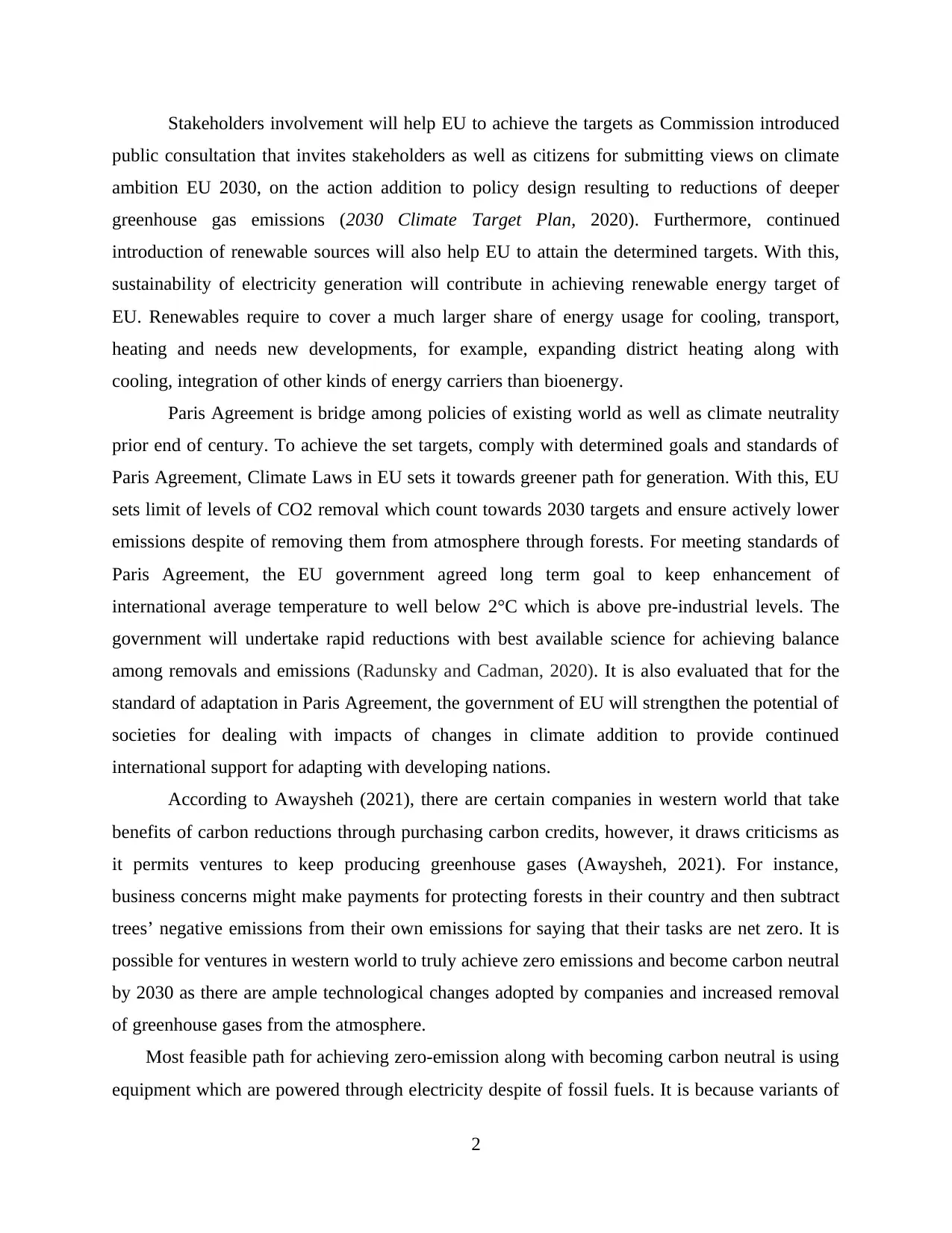
Stakeholders involvement will help EU to achieve the targets as Commission introduced
public consultation that invites stakeholders as well as citizens for submitting views on climate
ambition EU 2030, on the action addition to policy design resulting to reductions of deeper
greenhouse gas emissions (2030 Climate Target Plan, 2020). Furthermore, continued
introduction of renewable sources will also help EU to attain the determined targets. With this,
sustainability of electricity generation will contribute in achieving renewable energy target of
EU. Renewables require to cover a much larger share of energy usage for cooling, transport,
heating and needs new developments, for example, expanding district heating along with
cooling, integration of other kinds of energy carriers than bioenergy.
Paris Agreement is bridge among policies of existing world as well as climate neutrality
prior end of century. To achieve the set targets, comply with determined goals and standards of
Paris Agreement, Climate Laws in EU sets it towards greener path for generation. With this, EU
sets limit of levels of CO2 removal which count towards 2030 targets and ensure actively lower
emissions despite of removing them from atmosphere through forests. For meeting standards of
Paris Agreement, the EU government agreed long term goal to keep enhancement of
international average temperature to well below 2°C which is above pre-industrial levels. The
government will undertake rapid reductions with best available science for achieving balance
among removals and emissions (Radunsky and Cadman, 2020). It is also evaluated that for the
standard of adaptation in Paris Agreement, the government of EU will strengthen the potential of
societies for dealing with impacts of changes in climate addition to provide continued
international support for adapting with developing nations.
According to Awaysheh (2021), there are certain companies in western world that take
benefits of carbon reductions through purchasing carbon credits, however, it draws criticisms as
it permits ventures to keep producing greenhouse gases (Awaysheh, 2021). For instance,
business concerns might make payments for protecting forests in their country and then subtract
trees’ negative emissions from their own emissions for saying that their tasks are net zero. It is
possible for ventures in western world to truly achieve zero emissions and become carbon neutral
by 2030 as there are ample technological changes adopted by companies and increased removal
of greenhouse gases from the atmosphere.
Most feasible path for achieving zero-emission along with becoming carbon neutral is using
equipment which are powered through electricity despite of fossil fuels. It is because variants of
2
public consultation that invites stakeholders as well as citizens for submitting views on climate
ambition EU 2030, on the action addition to policy design resulting to reductions of deeper
greenhouse gas emissions (2030 Climate Target Plan, 2020). Furthermore, continued
introduction of renewable sources will also help EU to attain the determined targets. With this,
sustainability of electricity generation will contribute in achieving renewable energy target of
EU. Renewables require to cover a much larger share of energy usage for cooling, transport,
heating and needs new developments, for example, expanding district heating along with
cooling, integration of other kinds of energy carriers than bioenergy.
Paris Agreement is bridge among policies of existing world as well as climate neutrality
prior end of century. To achieve the set targets, comply with determined goals and standards of
Paris Agreement, Climate Laws in EU sets it towards greener path for generation. With this, EU
sets limit of levels of CO2 removal which count towards 2030 targets and ensure actively lower
emissions despite of removing them from atmosphere through forests. For meeting standards of
Paris Agreement, the EU government agreed long term goal to keep enhancement of
international average temperature to well below 2°C which is above pre-industrial levels. The
government will undertake rapid reductions with best available science for achieving balance
among removals and emissions (Radunsky and Cadman, 2020). It is also evaluated that for the
standard of adaptation in Paris Agreement, the government of EU will strengthen the potential of
societies for dealing with impacts of changes in climate addition to provide continued
international support for adapting with developing nations.
According to Awaysheh (2021), there are certain companies in western world that take
benefits of carbon reductions through purchasing carbon credits, however, it draws criticisms as
it permits ventures to keep producing greenhouse gases (Awaysheh, 2021). For instance,
business concerns might make payments for protecting forests in their country and then subtract
trees’ negative emissions from their own emissions for saying that their tasks are net zero. It is
possible for ventures in western world to truly achieve zero emissions and become carbon neutral
by 2030 as there are ample technological changes adopted by companies and increased removal
of greenhouse gases from the atmosphere.
Most feasible path for achieving zero-emission along with becoming carbon neutral is using
equipment which are powered through electricity despite of fossil fuels. It is because variants of
2
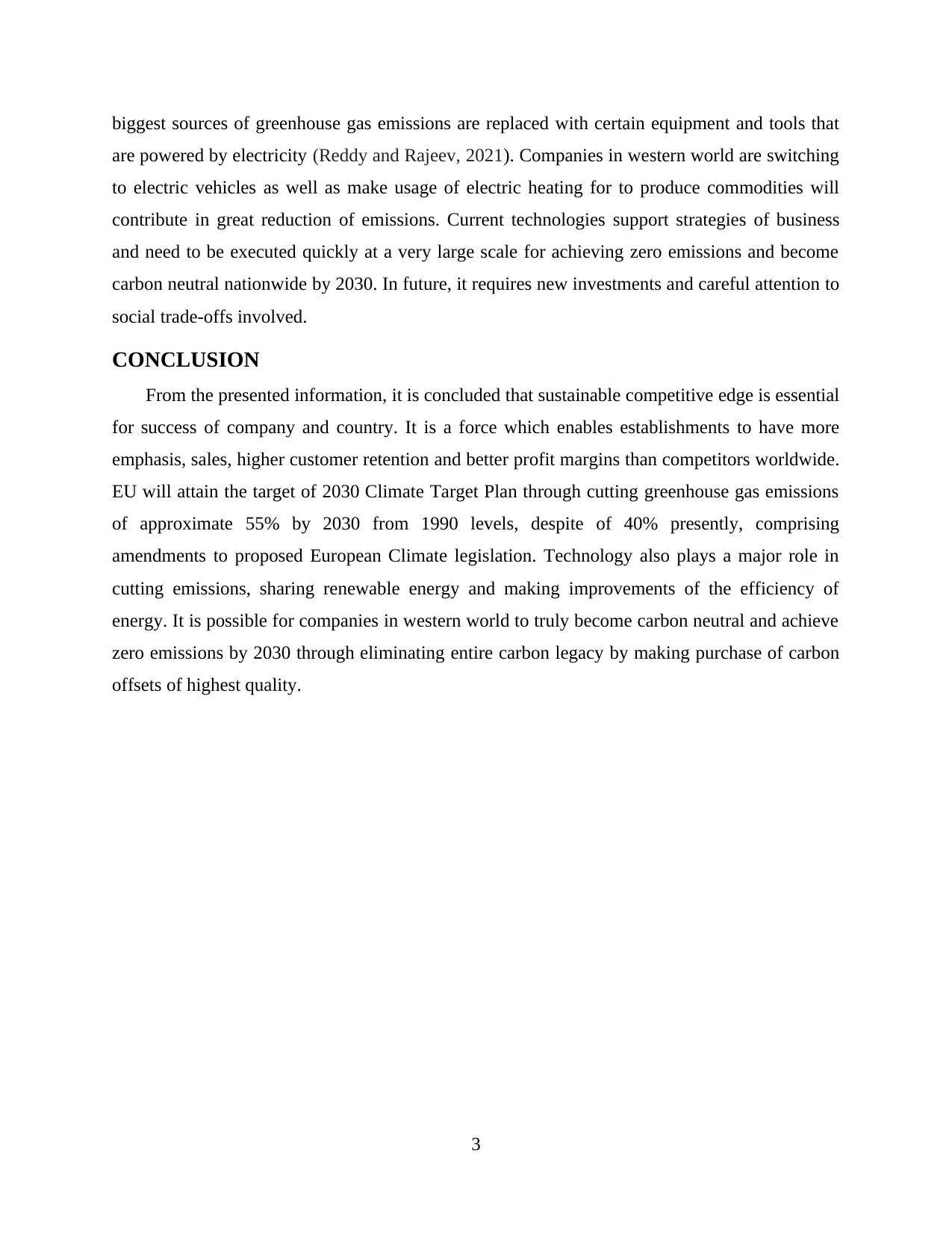
biggest sources of greenhouse gas emissions are replaced with certain equipment and tools that
are powered by electricity (Reddy and Rajeev, 2021). Companies in western world are switching
to electric vehicles as well as make usage of electric heating for to produce commodities will
contribute in great reduction of emissions. Current technologies support strategies of business
and need to be executed quickly at a very large scale for achieving zero emissions and become
carbon neutral nationwide by 2030. In future, it requires new investments and careful attention to
social trade-offs involved.
CONCLUSION
From the presented information, it is concluded that sustainable competitive edge is essential
for success of company and country. It is a force which enables establishments to have more
emphasis, sales, higher customer retention and better profit margins than competitors worldwide.
EU will attain the target of 2030 Climate Target Plan through cutting greenhouse gas emissions
of approximate 55% by 2030 from 1990 levels, despite of 40% presently, comprising
amendments to proposed European Climate legislation. Technology also plays a major role in
cutting emissions, sharing renewable energy and making improvements of the efficiency of
energy. It is possible for companies in western world to truly become carbon neutral and achieve
zero emissions by 2030 through eliminating entire carbon legacy by making purchase of carbon
offsets of highest quality.
3
are powered by electricity (Reddy and Rajeev, 2021). Companies in western world are switching
to electric vehicles as well as make usage of electric heating for to produce commodities will
contribute in great reduction of emissions. Current technologies support strategies of business
and need to be executed quickly at a very large scale for achieving zero emissions and become
carbon neutral nationwide by 2030. In future, it requires new investments and careful attention to
social trade-offs involved.
CONCLUSION
From the presented information, it is concluded that sustainable competitive edge is essential
for success of company and country. It is a force which enables establishments to have more
emphasis, sales, higher customer retention and better profit margins than competitors worldwide.
EU will attain the target of 2030 Climate Target Plan through cutting greenhouse gas emissions
of approximate 55% by 2030 from 1990 levels, despite of 40% presently, comprising
amendments to proposed European Climate legislation. Technology also plays a major role in
cutting emissions, sharing renewable energy and making improvements of the efficiency of
energy. It is possible for companies in western world to truly become carbon neutral and achieve
zero emissions by 2030 through eliminating entire carbon legacy by making purchase of carbon
offsets of highest quality.
3
⊘ This is a preview!⊘
Do you want full access?
Subscribe today to unlock all pages.

Trusted by 1+ million students worldwide
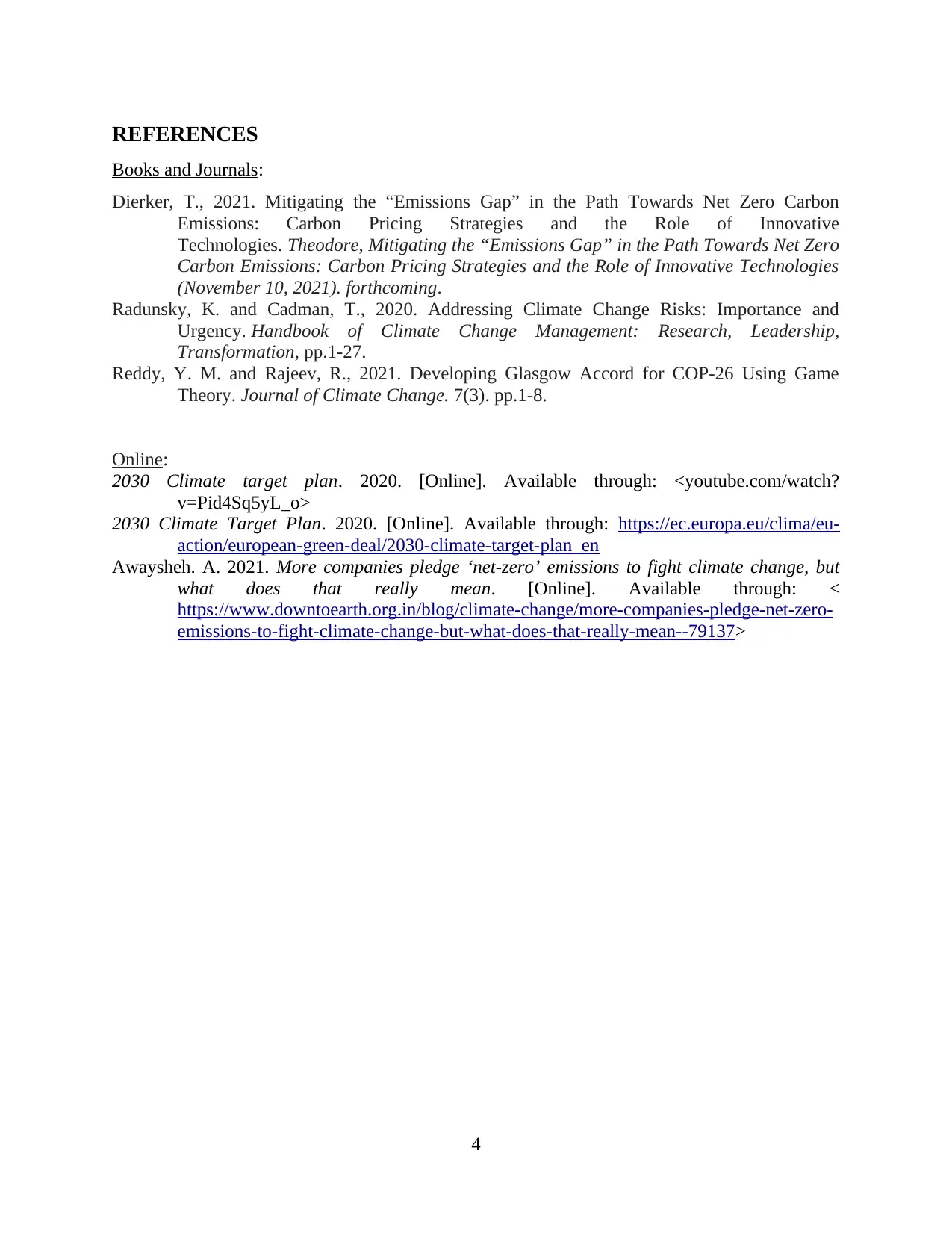
REFERENCES
Books and Journals:
Dierker, T., 2021. Mitigating the “Emissions Gap” in the Path Towards Net Zero Carbon
Emissions: Carbon Pricing Strategies and the Role of Innovative
Technologies. Theodore, Mitigating the “Emissions Gap” in the Path Towards Net Zero
Carbon Emissions: Carbon Pricing Strategies and the Role of Innovative Technologies
(November 10, 2021). forthcoming.
Radunsky, K. and Cadman, T., 2020. Addressing Climate Change Risks: Importance and
Urgency. Handbook of Climate Change Management: Research, Leadership,
Transformation, pp.1-27.
Reddy, Y. M. and Rajeev, R., 2021. Developing Glasgow Accord for COP-26 Using Game
Theory. Journal of Climate Change. 7(3). pp.1-8.
Online:
2030 Climate target plan. 2020. [Online]. Available through: <youtube.com/watch?
v=Pid4Sq5yL_o>
2030 Climate Target Plan. 2020. [Online]. Available through: https://ec.europa.eu/clima/eu-
action/european-green-deal/2030-climate-target-plan_en
Awaysheh. A. 2021. More companies pledge ‘net-zero’ emissions to fight climate change, but
what does that really mean. [Online]. Available through: <
https://www.downtoearth.org.in/blog/climate-change/more-companies-pledge-net-zero-
emissions-to-fight-climate-change-but-what-does-that-really-mean--79137>
4
Books and Journals:
Dierker, T., 2021. Mitigating the “Emissions Gap” in the Path Towards Net Zero Carbon
Emissions: Carbon Pricing Strategies and the Role of Innovative
Technologies. Theodore, Mitigating the “Emissions Gap” in the Path Towards Net Zero
Carbon Emissions: Carbon Pricing Strategies and the Role of Innovative Technologies
(November 10, 2021). forthcoming.
Radunsky, K. and Cadman, T., 2020. Addressing Climate Change Risks: Importance and
Urgency. Handbook of Climate Change Management: Research, Leadership,
Transformation, pp.1-27.
Reddy, Y. M. and Rajeev, R., 2021. Developing Glasgow Accord for COP-26 Using Game
Theory. Journal of Climate Change. 7(3). pp.1-8.
Online:
2030 Climate target plan. 2020. [Online]. Available through: <youtube.com/watch?
v=Pid4Sq5yL_o>
2030 Climate Target Plan. 2020. [Online]. Available through: https://ec.europa.eu/clima/eu-
action/european-green-deal/2030-climate-target-plan_en
Awaysheh. A. 2021. More companies pledge ‘net-zero’ emissions to fight climate change, but
what does that really mean. [Online]. Available through: <
https://www.downtoearth.org.in/blog/climate-change/more-companies-pledge-net-zero-
emissions-to-fight-climate-change-but-what-does-that-really-mean--79137>
4
1 out of 7
Related Documents
Your All-in-One AI-Powered Toolkit for Academic Success.
+13062052269
info@desklib.com
Available 24*7 on WhatsApp / Email
![[object Object]](/_next/static/media/star-bottom.7253800d.svg)
Unlock your academic potential
Copyright © 2020–2026 A2Z Services. All Rights Reserved. Developed and managed by ZUCOL.





